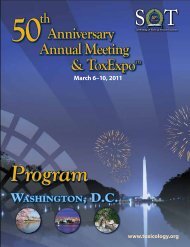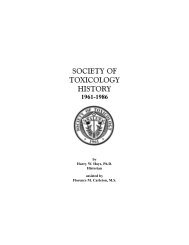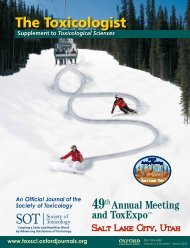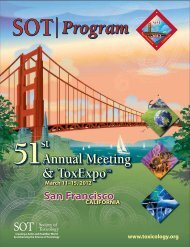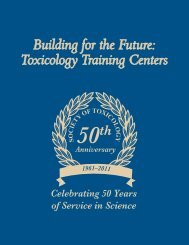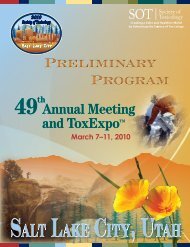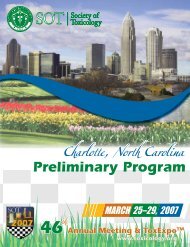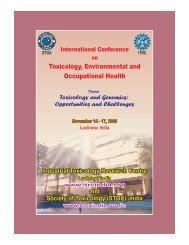51st Annual Meeting & ToxExpo - Society of Toxicology
51st Annual Meeting & ToxExpo - Society of Toxicology
51st Annual Meeting & ToxExpo - Society of Toxicology
Create successful ePaper yourself
Turn your PDF publications into a flip-book with our unique Google optimized e-Paper software.
<strong>Society</strong> <strong>of</strong> <strong>Toxicology</strong> 2012<br />
Continuing Education<br />
CE<br />
Aberrant Gene Expression in Toxicity<br />
and Disease—Epigenetics and<br />
microRNAs<br />
Applications <strong>of</strong> Biomarkers in the Assessment <strong>of</strong><br />
Health and Disease<br />
AM02<br />
CE Advanced<br />
Chairperson(s): Vishal S. Vaidya, Harvard Medical School, Boston,<br />
MA, and Donna L. Mendrick, US FDA, Jefferson, AR.<br />
Sponsor:<br />
Drug Discovery <strong>Toxicology</strong> Specialty Section<br />
Endorsed by:<br />
Association <strong>of</strong> Scientists <strong>of</strong> Indian Origin Special Interest Group<br />
Disease Prevention Task Force<br />
Risk Assessment Specialty Section<br />
Biomarkers serve as quantitative measures <strong>of</strong> chemical exposures<br />
and biologically effective doses, early warning signals <strong>of</strong> biologic<br />
effect, predict outcome in a patient with disease, and identify who<br />
will respond to an intervention and whether the intervention is<br />
working. The current era <strong>of</strong> scientific discovery has brought seemingly<br />
limitless opportunities for improvements in medical care.<br />
Translational biomarkers that can be measured in blood or urine<br />
in both experimental animals and man are <strong>of</strong> particular interest.<br />
Given the importance to the clinical, pharmaceutical, and regulatory<br />
communities motivated by more specific and timely diagnoses, early<br />
intervention, and safer therapies, clinically useful biomarkers have<br />
evolved over time, reflecting the scientific and technologic progress<br />
made over the centuries. An increasing number <strong>of</strong> clinically relevant<br />
tests and procedures are available to estimate organ injury and guide<br />
treatment. The use <strong>of</strong> molecular signals in the assessment <strong>of</strong> health and<br />
disease is not new; however, the concept <strong>of</strong> what constitutes a useful<br />
biomarker has evolved considerably in the past two to three decades<br />
given the advanced enabling technologies, the deeper molecular<br />
understanding <strong>of</strong> disease, and the advent <strong>of</strong> a regulatory framework<br />
for biomarker qualification. Our panel experts will highlight the<br />
potential <strong>of</strong> these molecular signals over a wide variety <strong>of</strong> applications<br />
spanning preclinical–clinical safety and disease monitoring in therapeutic<br />
and environmental exposures pertaining to cancer, and lung,<br />
heart, and kidney disease. Coordinated efforts at biomarker discovery<br />
and validation as well as technologies for biomarker measurement<br />
will help ensure that the ultimate goal <strong>of</strong> safer drugs, a cleaner environment,<br />
and improved patient outcomes is realized.<br />
• Introduction. Donna L. Mendrick, US FDA, Jefferson, AR.<br />
• Discovering Cancer Biomarkers: From Diagnosis and Prognosis<br />
through Therapy. Marsha A. Moses, Children’s Hospital-Boston,<br />
Harvard Medical School, Boston, MA.<br />
• Advanced Molecular Biomarkers in Understanding Lung<br />
Exposure Biology. David E. Christiani, Harvard School <strong>of</strong> Public<br />
Health, Boston, MA.<br />
• Biomarkers <strong>of</strong> Cardiac Dysfunction—Beyond Troponins.<br />
James R. Turk, Amgen, Inc., Thousand Oaks, CA.<br />
• Kidney Safety Signal: From Identification to Point <strong>of</strong> Care<br />
Testing. Vishal S. Vaidya, Harvard Medical School, Boston, MA.<br />
Basic Embryology and Developmental<br />
Toxicity Testing<br />
AM03<br />
CE Basic<br />
Chairperson(s): Christopher J. Bowman, Pfizer Worldwide Research<br />
and Development, Groton, CT, and Lori A. Dostal, Exponent, Inc.,<br />
Farmington Hills, MI.<br />
Sponsor:<br />
Reproductive and Developmental <strong>Toxicology</strong> Specialty Section<br />
Endorsed by:<br />
Regulatory and Safety Evaluation Specialty Section<br />
Embryonic and fetal development in mammalian species is a complex<br />
process that is sensitive to the effects <strong>of</strong> maternal and environmental<br />
factors. The timing <strong>of</strong> development <strong>of</strong> the major organ systems varies<br />
between humans and other animal species, but the basic biology <strong>of</strong><br />
development is similar in all species, thus allowing extrapolation<br />
<strong>of</strong> animal testing results for xenobiotics to humans. The course<br />
will begin by providing an overview that highlights developmental<br />
biology from fertilization <strong>of</strong> the gametes to normal maturation <strong>of</strong> a<br />
full-term placenta and fetus, including examples <strong>of</strong> developmental<br />
toxicants and teratogens with known modes <strong>of</strong> action. Subsequently,<br />
applied toxicology concepts for evaluation <strong>of</strong> the potential for bio/<br />
pharmaceuticals and chemicals to affect pregnancy and embry<strong>of</strong>etal<br />
development will be discussed. Global regulatory strategies and<br />
requirements to minimize health effects on women and unborn children<br />
will also be addressed. Finally, key information will be presented<br />
to provide for a better understanding <strong>of</strong> the biological and toxicological<br />
basis <strong>of</strong> prenatal developmental toxicity testing and the impact <strong>of</strong><br />
various outcomes on drug development, chemical use, environmental<br />
impact, and human health risk.<br />
• Introduction. Lori A. Dostal, Exponent, Inc., Farmington Hills, MI.<br />
• Implantation, Placentation, and Early Embryonic Development.<br />
John M. DeSesso, Exponent, Inc., Alexandria, VA.<br />
• Demystifying Mammalian Embryogenesis.<br />
Kathleen K. Sulik, University <strong>of</strong> North Carolina, Chapel Hill, NC.<br />
• The Importance <strong>of</strong> Developmental Toxicity Testing to<br />
Pharmaceutical Development. Kimberley A. Treinen, Merck,<br />
Summit, NJ.<br />
Thematic Session<br />
54<br />
SOT’s 51 st <strong>Annual</strong> <strong>Meeting</strong>



